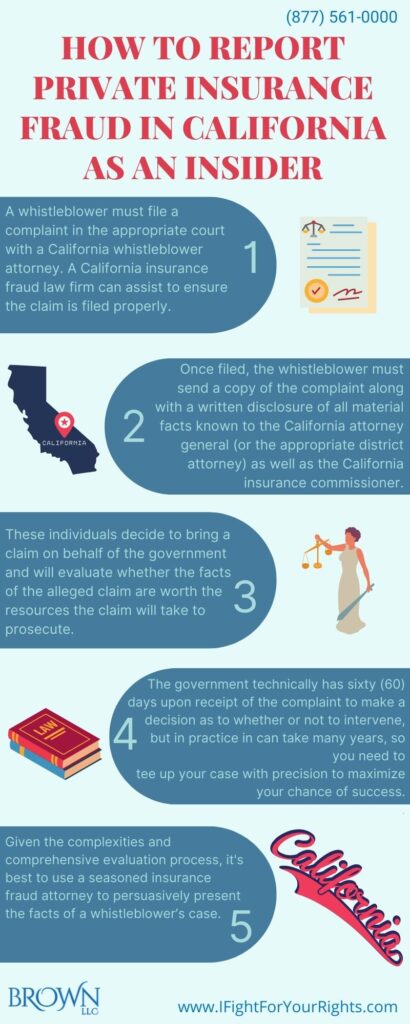How to Report Private Insurance Fraud in California as an Insider

Reporting California private insurance fraud as an insider can be quite lucrative given the financial rewards thanks to an innovative California statute that encourages whistleblowers to report fraud. Under the California Insurance Frauds Prevention Act, whistleblowers (also known as relators) can bring what are called qui tam lawsuits against those who commit fraud against private insurance companies. The Act provides substantial incentives for whistleblowers, which includes a share of any money recovered in a successful claim. The share can range from a minimum of 30% to a maximum of 50% of any settlement or trial award, depending on whether the government decides to intervene in the lawsuit and the extent of the whistleblower’s contribution to the case. Along with possible triple damages a million dollar fraud, could trigger three million in damages and as high as a $1.5 million California private insurance whistleblower award. A potential California private insurance whistleblower should be aware that bringing a case of California insurance fraud under the act requires careful consideration and often requires the assistance of attorneys who have experience with California insurance fraud law, as the process can be complex and challenging. These experienced attorneys guide whistleblowers through the process, helping to maximize the potential rewards and minimize the risks involved.
The Definition of Insurance Fraud
California Insurance Fraud is addressed in both the California Penal Code and the California Insurance Code. California Penal Code §548-550 provides the definition of various types of insurance fraud, including: i) the destruction of insured property with an intent to defraud an insurer; ii) conflicts of interest in insurance claims; and iii) fraudulent claims for payment of a loss, an injury that did not occur, or multiple claims for the same loss. The California Insurance Code also addresses insurance fraud in the California Insurance Frauds Prevention Act which is codified in §1871-1871.9. These sections outline the definition of submitting false statements for insurance claims and the exaggeration of damages or injuries.
The California Insurance Frauds Prevention Act
The California Insurance Frauds Prevention Act was enacted in 1993. The act was established to combat California insurance fraud, particularly targeting health insurance fraud against private insurance companies. Under the act, a California private insurance whistleblower can file a qui tam lawsuit, which allows private citizens to sue on behalf of California against those who commit insurance fraud. This includes insiders at companies or health insurance providers who are aware of ongoing fraud. Violations can result in penalties ranging from $5,000 to $10,000 per violation, in addition to treble damages, which are three times the amount of the alleged fraud.
To incentivize individuals to be forthcoming, the act provides whistleblowers with a share of the financial reward recovered in successful claim. If either the California attorney general (or the appropriate district attorney) or the state insurance commissioner decide to proceed to prosecute the case (known as “intervening”), the whistleblower may be entitled to thirty to forty percent (30-40%) of the recovered amount. If neither decides to intervene, the California private insurance whistleblower may still elect to proceed with the case on his or her own and may be entitled to forty to fifty percent (40-50%) of the recovered amount.
Speak with the Lawyers at Brown, LLC Today!
Over 100 million in judgments and settlements trials in state and federal courts. We fight for maximum damage and results.
Bringing a Claim of California Private Insurance Fraud
California Insurance Code §1871.7 outlines the procedural steps for a relator to bring a claim under the California Insurance Frauds Prevention Act. First, a whistleblower must file a complaint in the appropriate court. These claims are filed under seal which keeps the whistleblower’s identity confidential from the defendant during the initial process of evaluation. A California insurance fraud law firm can assist to ensure the claim is filed properly. Once filed, the whistleblower must send a copy of the complaint along with a written disclosure of all material facts known to the California attorney general (or the appropriate district attorney) as well as the California insurance commissioner. These individuals decide to bring a claim on behalf of the government and will evaluate whether the facts of the alleged claim are worth the resources the claim will take to prosecute. The government may follow up with phone calls, interview requests, requests for documents, and other questions to evaluate the evidence. The government has sixty (60) days upon receipt of the complaint and the material facts to review all the information. After this time period is up, the government must make a decision as to whether or not to intervene. Given the complexities and comprehensive evaluation process, it’s best to use a seasoned insurance fraud attorney to persuasively present the facts of a whistleblower’s case, and swiftly complete all necessary and additional tasks needed for a case to remain attractive to the government authorities.
An important point of the California Insurance Frauds Prevention Act is that it provides protections for whistleblowers to further incentivize those to bring forward information. Aside from the confidentiality protection when the case is filed under seal, the government may also take action against employers who try to retaliate against those who brought forward the claim. Employees who face retaliation for their involvement in these cases can seek legal remedies, including reinstatement, double back pay plus interest, and compensation for any special damages incurred, including attorney’s fees and reasonable litigation costs. A California insurance fraud law firm will be able to help assist the whistleblower with these statutory protections as well as try to structure things to minimize impact
Notable Claims Under the California Insurance Frauds Prevention Act
Some notable California Private Insurance Fraud claims brought by an insider under the California Insurance Frauds Prevention Act include:
- Warner Chilcott: In 2012, a California insurance fraud law firm filed a claim on behalf of a relator against Warner Chilcott, a pharmaceutical company. Warner Chilcott elected to settle the allegations of illegal marketing practices that led to violations of anti-kickback statutes and privacy laws for the amount of $23.2 million. The insiders who reported the information were awarded 49% California insurance fraud whistleblower award
- Bristol-Meyers Squibb: In 2016, three former Bristol-Meyers Squibb employees brought a claim against the company alleging that physicians were targeted with lavish gifts and incentives to increase the prescription of several drugs, including one used to lower cholesterol. Bristol-Meyers Squibb elected to settle the claim for $30 million which could have triggered as high as $15 million in California insurance fraud whistleblower rewards
- Chiropractor Kickback Scheme: In 2021, twelve (12) chiropractors were charged in a $2.5 million insurance fraud scheme involving automobile collision medical claims which led to multiple insurance companies allegedly being defrauded
As illustrated, there are millions of reasons to report private insurance fraud in California, and no reason to keep quiet. If you know of fraud against insurance in California you should have a free, confidential consultation whistleblower consultation to understand your rights.

